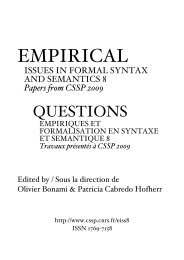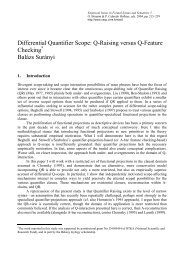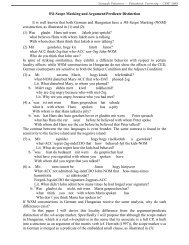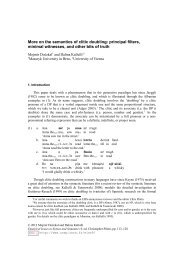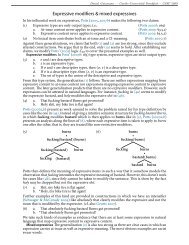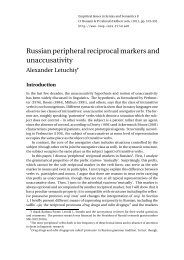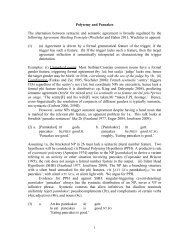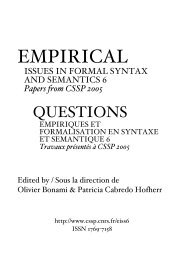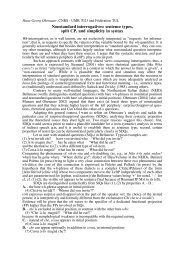Empirical Issues in Syntax and Semantics 9 (EISS 9 ... - CSSP - CNRS
Empirical Issues in Syntax and Semantics 9 (EISS 9 ... - CSSP - CNRS
Empirical Issues in Syntax and Semantics 9 (EISS 9 ... - CSSP - CNRS
You also want an ePaper? Increase the reach of your titles
YUMPU automatically turns print PDFs into web optimized ePapers that Google loves.
(29) a. (E) lexova çdo libër.<br />
CL.ACC.3S read.1s every book<br />
‘I read each book.’<br />
b.(E) lexova secil<strong>in</strong> libër.<br />
CL.ACC.3S read.1s each.the ACC book<br />
‘I read each book.’<br />
c. (I) lexova më të shumtët (e librave).<br />
them Cl.ACC read.1s sup most.pl.the agr books.the ACC<br />
‘I read most (books).’<br />
d.Nuk (e) lexova asnjër<strong>in</strong> (libër) / (prej librave).<br />
not CL.ACC.3S read.1s neither.the ACC book / from books.the DAT<br />
‘I read neither (book / of the books).’<br />
However, the fact that the DPs headed by these strong determ<strong>in</strong>ers may be clitic doubled is<br />
not necessarily an argument aga<strong>in</strong>st Endriss’ 2009 framework because the m<strong>in</strong>imal witness set<br />
for the universal quantifiers is the same for s<strong>in</strong>gular <strong>and</strong> plural; the m<strong>in</strong>imal witness set for the<br />
quantifiers every book, all books <strong>and</strong> each book <strong>in</strong> any model would be the same, namely the<br />
set of all the books <strong>in</strong> the universe of discourse. Other th<strong>in</strong>gs be<strong>in</strong>g equal, we would then expect<br />
universal quantifiers to be good topics <strong>in</strong>dependently of their grammatical number, with the<br />
consequence that the English facts <strong>in</strong> (20b) are surpris<strong>in</strong>g. Indeed Endriss 2009 attributes the<br />
non-topicability of s<strong>in</strong>gular universal quantifiers to a clash between the denotation of the<br />
m<strong>in</strong>imal witness set <strong>and</strong> the morphological number of the quantifier (<strong>and</strong> the morphological<br />
number of the resumptive pronoun <strong>in</strong> the case of left-dislocated noun phrases like <strong>in</strong> (20b)).<br />
Accord<strong>in</strong>g to her, because the m<strong>in</strong>imal witness set denotes plurality <strong>and</strong> the grammatical<br />
number on the quantifier (<strong>and</strong> the resumptive pronoun) is s<strong>in</strong>gular, there arises a mismatch,<br />
which is the reason for the ungrammaticality of s<strong>in</strong>gular universal quantifiers <strong>in</strong> syntactic<br />
positions associated with topics. It could be hypothesized that, for some reason, this clash <strong>in</strong><br />
number doesn’t arise <strong>in</strong> Albanian, hence the s<strong>in</strong>gular universal quantifiers are topicable <strong>in</strong> this<br />
language, perhaps due to the fact that clitics are very light elements (although they are not<br />
underspecified for number <strong>in</strong> Albanian). We would need to exam<strong>in</strong>e this hypothesis more<br />
thoroughly, but for now suffice it to mention that, as is well-known, a simple mapp<strong>in</strong>g between<br />
s<strong>in</strong>gular grammatical number <strong>and</strong> non-plurality of its denotation isn’t always viable. For<br />
<strong>in</strong>stance, collective nouns like team or government <strong>in</strong> English denote pluralities but are<br />
grammatically s<strong>in</strong>gular (even though they may determ<strong>in</strong>e plural agreement). Similarly, from a<br />
cross-l<strong>in</strong>guistic perspective, Slavic languages exhibit s<strong>in</strong>gular verbal agreement with subject<br />
DPs headed by numerals higher then four.<br />
Another problematic case is the determ<strong>in</strong>er asnjër<strong>in</strong> ‘neither (one of the)’/‘none (of the)’.<br />
As the determ<strong>in</strong>er is negative strong, its m<strong>in</strong>imal witness set is simply the empty set. Be<strong>in</strong>g so,<br />
we would expect that clitic doubl<strong>in</strong>g of a DP headed by this determ<strong>in</strong>er shouldn’t be possible,<br />
contrary to fact – see (29d). We assume that the reason for this is the presuppositional behavior<br />
of determ<strong>in</strong>ers like neither. In this respect, there is a common core for all four quantifiers<br />
discussed <strong>in</strong> the present section: all these determ<strong>in</strong>ers are presuppositional, i.e., they presuppose<br />
the non-empt<strong>in</strong>ess of the set denoted by their noun argument. We cannot go <strong>in</strong>to the details of<br />
the presuppositional treatment of quantifiers here but would nonetheless like to mention that<br />
there is an ongo<strong>in</strong>g discussion between the presuppositional <strong>and</strong> non-presuppositional treatment<br />
of quantifiers, which as far as we know has not been resolved yet. But start<strong>in</strong>g at least with<br />
Barwise & Cooper (1981), it is usual to treat the determ<strong>in</strong>ers the, both, <strong>and</strong> neither as<br />
presuppositional. Nevertheless other determ<strong>in</strong>ers such as every, all, <strong>and</strong> most are also<br />
sometimes considered presuppositional, so basically all strong determ<strong>in</strong>ers are argued to<br />
123



